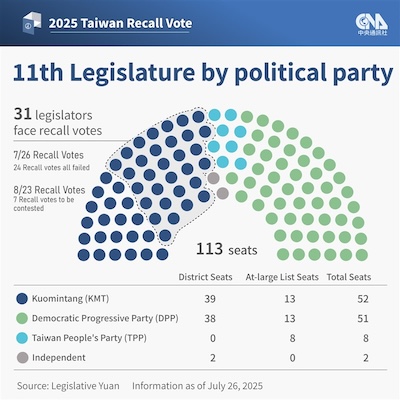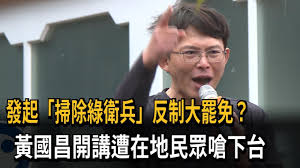The results of Taiwan’s July 26 recall election revealed a complete defeat for the pro-recall side, with the opposition Kuomintang (KMT) and Taiwan People’s Party (TPP) sweeping all contested districts. While civic groups poured energy into the campaign, the Democratic Progressive Party (DPP) leadership appeared indifferent, despite being targeted by the opposition as the recall’s main opponent.
After the election, DPP Secretary-General Lin Yu-chang held a press conference, thanking recall organizers but framing the outcome as a failure of the civic groups—not the DPP. While sounding gracious, his words implied the party bore no responsibility, which many interpreted as avoidance rather than accountability.

Prominent pro-democracy entrepreneur Robert Tsao, who supported the recall, admitted that grassroots groups were exhausted after the petition stage and had hoped the DPP would take over for the final push. But the party insisted it was merely a “side player,” a decision Tsao said foretold the recall’s likely failure.
While some argued that local DPP officials worked hard, standing at street corners and canvassing neighborhoods, the central party’s inaction was glaring. There was no campaign headquarters, no general coordinator, and none of the usual star campaigners. In contrast, the KMT mobilized all six mayors of Taiwan’s major cities, along with both KMT and TPP leaders, treating the recall like a national election.
Some DPP supporters argued that full participation would have turned the recall into a “blue vs. green” battle. But this had already happened—merely denying it at press conferences did little to change public perception.
Ironically, while DPP supporters often mock the TPP for being “unprepared,” in this key moment, the DPP itself offered little more than symbolic support, letting citizens do the heavy lifting. If the recall had succeeded, the DPP would have gained from subsequent by-elections; but with its failure, the party washes its hands of the outcome—a mindset arguably worse than the TPP’s.
Civic groups expressed deep concern that without the recall, controversial legislation such as relaxed residency rules for Chinese spouses, cuts to housing subsidies, and weakened oversight could now pass. Yet, the DPP appears to hope the KMT will “come to its senses,” adopting a passive and unrealistic stance, likened to an emperor indifferent to the panic of his court.
While the public feels a looming “sense of national crisis,” the DPP behaves as if nothing has changed. Some now argue that the DPP must counter undemocratic laws with non-compliance, even if it triggers a constitutional deadlock. Others urge dialogue and compromise.
Trapped between a divided public and its own hesitant leadership, the DPP must face a hard question: In these critical times, does it still have the strength—and will—to take responsibility?



